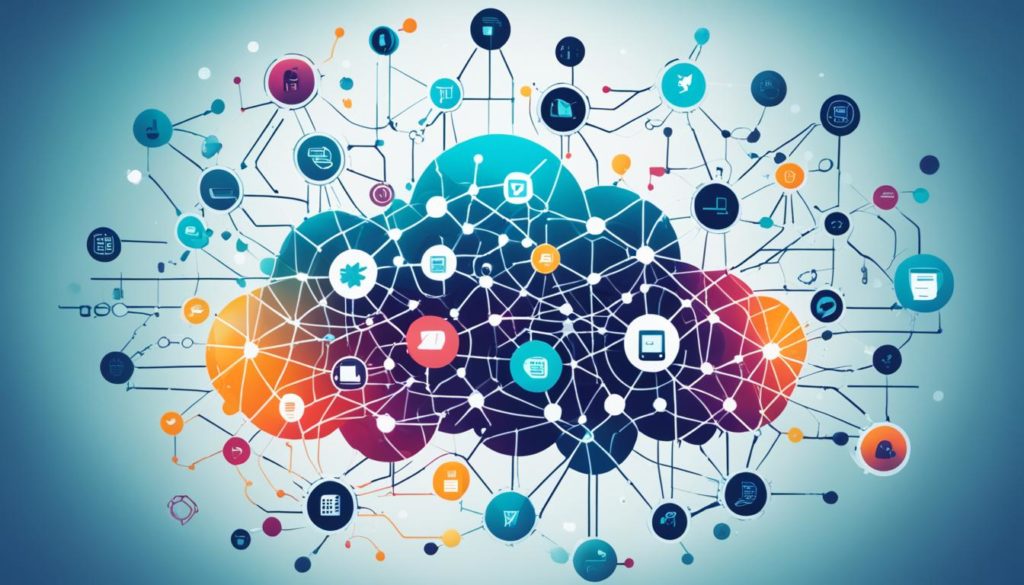
In June 2023, JPMorgan Chase & Co. highlighted 3,600 job openings. They were looking for AI experts. This shows there’s a big need for professionals who understand AI in finance.
AI forecasting helps businesses work smarter. It does this by looking at past sales, how customers act, and market changes. It predicts things like when the supply chain might face problems. This allows companies to act ahead and avoid big issues.
AI is also excellent at spotting fraud in real time. It checks financial transactions, finds odd things, and stops fraud. This can save companies a lot of money. It shows just how important AI is for keeping a business safe from risks. AI also makes financial planning more transparent and flexible. It offers immediate analysis and keeps learning to stay on top of changes.
Getting started in this field means making strong AI models. These should work smoothly with the financial tools a company already uses. They help businesses operate better and make smarter choices. They do this by using the most up-to-date forecasts.
Key Takeaways
- 3,600 job openings at JPMorgan Chase & Co. illustrate the high demand for AI in finance.
- AI models let businesses manage their stock better and see market shifts coming.
- AI checks transactions in real time to stop fraud and protect finances.
- Adding AI to financial systems makes work smoother and decisions smarter.
- AI that keeps learning adapts well to market changes over time.
For those eyeing future trend predictions, AI forecasting is the route to go. It promises more accurate insights, efficiency, and growth strategies.
Understanding AI Forecasting: Definition and Importance
We will explore AI forecasting, what it means, and why it’s key for today’s businesses.
What is AI Forecasting?
AI forecasting uses advanced tech to predict future events. It focuses on machine learning and predictive analytics. These tools allow AI to quickly process data, making accurate forecasts. These forecasts help businesses make quick, informed decisions.
The Importance of AI in Modern Business
In the current business world, AI forecasting is vital. It offers real-time analysis and can adapt to new data quickly. This means businesses can plan better and react faster than using manual methods.
Comparison with Traditional Forecasting Methods
Traditional methods for forecasting look at past data. They usually use simple models. But these can’t always handle fast market changes well. AI forecasting, with its ability to spot complex patterns, is much more flexible. This edge helps companies overcome the challenges of today’s markets.
| Traditional Forecasting | AI Forecasting | |
|---|---|---|
| Data Handling | Limited by volume and complexity | Capable of processing vast datasets |
| Accuracy | Prone to human error | Highly accurate |
| Speed | Time-intensive | Real-time analysis |
| Adaptability | Rigid and static | Dynamic and adaptable |
Using AI forecasting helps businesses improve their operations and strategies. It does this by providing better accuracy, speed, and the ability to adapt.
Building the Right Foundation for AI Success
Creating a solid framework for AI success involves several key steps. It begins by working with experts on data forecasting. Companies need to team up with data specialists, focus on staff training, ensure data is clean, and pick the best AI tech.
Collaborating with Data Specialists
Every company should work closely with data specialists. Alysa Taylor from Microsoft says AI use depends on the industry. It’s about improving how employees work, engage with customers, and handle business tasks. Companies can use AI technology better by getting advice from these specialists.
The Role of Training and Development
Training teams to use data forecasting is crucial. It helps create a culture where everyone understands data. Gartner found that organizations with a clear AI plan are more likely to succeed with it. So, structured training to understand machine learning algorithms is key.
Ensuring Data Quality
Good data is essential for effective AI. Well-managed data helps AI make accurate predictions. Firms like JPMorgan Chase hire AI specialists to keep their data clean. Gartner says measuring success with KPIs, like customer satisfaction, is vital for seeing how well AI works.
Choosing the Right AI Technology
Picking the right AI tech is important to gain useful insights. The tech chosen, like natural language processing, must meet the company’s needs and budget. Gartner research shows that better AI organizations think about using AI in every situation. For more tips on using AI, check out this leader’s guide on building the best AI foundation.
Practical Applications of AI in Forecasting
Artificial intelligence is changing how we predict future events in business. It uses predictive models to make forecasting more accurate and efficient. This is seen in sales projections and spotting fraud. It helps make better decisions and runs things smoother.
Sales Forecasting
AI looks at past sales and current trends to make predictions about the future. By understanding what customers do and considering outside factors, it spots changes early on. This lets companies adjust their marketing and improve how they handle their products. It makes sure they have enough stock and plan ahead to meet customer needs.
Supply Chain Optimization
Thanks to AI, companies can better manage their supply chains. AI uses data like customer flow, weather, and past patterns to foresee problems. This helps prevent mistakes in supply chain management by half. It means smoother operations and saving money.
| Key AI Benefits | Impact Across Industries |
|---|---|
| Accuracy | Reduction in lost sales by up to 65% due to better inventory management |
| Efficiency | Warehouse expenses cut by 10-40% by avoiding unnecessary stock |
| Adaptability | Improved responsiveness to market changes and consumer behavior |
Fraud Detection
AI is key in spotting fraud by looking at transactions in real-time. It catches unusual activities, hinting at fraud early. This protects a company’s money and helps keep customers confident. A report by AFP Online notes how crucial AI is in making fraud protection strong and avoiding financial hits.
Key Benefits of AI Forecasting
AI forecasting helps businesses in many ways. It improves how well companies understand and predict consumer needs. This leads to better stock management and happier customers. By using data-driven forecasting, businesses can make sure their shelves are stocked just right.
Increased Accuracy
Forecasts get better with predictive analytics from AI. This means businesses are less likely to have too much or too little stock. AI uses all kinds of data to make sales and revenue forecasts sharper. It helps businesses plan marketing and budgets much more effectively.
- 45% of companies have integrated machine learning into their forecasting processes
- AI reduces errors by 30 to 50% in supply chain networks
- Lost sales due to out-of-stock scenarios can decrease by up to 65%
- AI-driven forecasting can add $1.2T to $2T in value to manufacturing and supply chain planning
Efficiency and Speed
AI makes forecasting faster and more efficient. This can save businesses money and improve how they operate. With the help of AI, companies predict what customers will buy. This cuts down on costs and helps them quickly adjust to new market trends.
Real-time Data Analysis
AI allows for quick and smart decision-making by analyzing data in real time. It helps businesses respond fast to changes in what customers want, market trends, and the economy. This ongoing data analysis means companies can keep their stock at the right levels and handle spikes in demand better, making their operations smoother.
| Benefits | AI Forecasting Impact |
|---|---|
| Cost Savings | Significant reduction in operational costs by planning based on expected demand. |
| Inventory Optimization | Minimized wastage and enhanced efficiency in resource allocation. |
| Customer Satisfaction | Maintained stock levels to meet consumer demand effectively. |
| Strategic Planning | Better planning and workforce management through accurate analysis. |
| Supply Chain Management | Streamlined production processes and enhanced customer satisfaction. |
Nowadays, using AI for forecasting is crucial for most businesses. It helps with tasks like predicting power use or handling patient numbers. AI can greatly improve how smart your company’s strategies are.
The Future of AI Forecasting
The forward march of AI forecasting points to a horizon full of improved clarity, learning on the go, and easy fitting. These steps enhance the trustworthiness of AI methods. They also lock in their importance for making big choices. As we venture into this changing age, studying each of these enhancements is key.
Enhanced Transparency
Upcoming AI forecasting shines brightest in clearer workings. With AIs deeply rooted in business ways, the importance of easy-to-understand model workings grows. Clear workings make all stakeholders trust the outcomes more. This trust changes how firms rely on and believe in economic predictions.
Adaptive Learning
Adaptive learning is a key stride forward. Unlike unchanging models, adaptive learning lets AIs grow with the market by constantly taking in fresh data. This keeps forecasts in touch with the real world and new trends. So, not only does this make predictions more precise, but it also keeps them pertinent and timely.
Seamless Integration
AI blending smoothly into current finance and operation setups marks the peak of its potential. This easy blend lets firms use AI insights right within their processes without any trouble. It ensures that AI works well with existing systems. This leads to better efficiency and smarter processes. It brings about major changes in economic forecasts and more.
With the progress of AI systems, we expect these aspects to become standard in our day-to-day. This big change makes strategies based on data normal. It also puts AI at the heart of staying ahead in the business game.
FAQ
What is AI Forecasting?
AI forecasting uses artificial intelligence, like machine learning and predictive analytics. It predicts future events and trends. This helps businesses by using past data, behavior patterns, and market dynamics.
The Importance of AI in Modern Business
AI forecasting is vital in business today. It offers real-time analysis and learns as new data comes in. It gives detailed insights, helping businesses make better decisions quickly and accurately, which is better than old, possibly mistaken ways of predicting the future.
Comparison with Traditional Forecasting Methods
Compared to traditional methods, AI forecasting can handle large data and changing market conditions well. It uses machine learning to make precise, up-to-date predictions. This approach helps companies get ahead by making better plans and strategies.
Collaborating with Data Specialists
For AI forecasting to work, businesses must work with data specialists. They clean and manage data so that the AI prediction models are accurate.
The Role of Training and Development
Teaching and developing staff with data skills is key for using AI tools well. It helps teams use AI for intelligent forecasting and predictive modeling effectively.
Ensuring Data Quality
Top-notch data is key for successful AI forecasting. Cleaning and managing data ensures its accuracy and reliability. This dramatically improves the quality of insights.
Choosing the Right AI Technology
Picking the best AI technology for forecasting means considering budget, knowledge, and business needs. Choosing the right machine learning and predictive analytics tools is critical for success.
Sales Forecasting
In sales, AI looks at past sales and market trends to predict future sales accurately. This helps companies target marketing better and manage inventory efficiently.
Supply Chain Optimization
AI forecasts in the supply chain predict disruptions. This information helps businesses avoid problems, keeping their supply chains running smoothly and resilient.
Fraud Detection
For spotting fraud, AI analyzes transactions in real time. This protects the money and trust of customers, making it a key use of AI in business today.
Increased Accuracy
AI boosts the accuracy of forecasts, leading to better plans and choices. With AI, forecast errors drop significantly for businesses.
Efficiency and Speed
AI is much faster at analyzing data than traditional means. When businesses use AI to automate tasks, they can react quickly to changes in the market, making their operations more efficient.
Real-time Data Analysis
Getting insights from data in real time with AI is crucial. It lets companies act as situations change, keeping them ahead.
Enhanced Transparency
The future of AI promises more clear and open model logic. This transparency builds trust in AI results, leading to smarter business decisions.
Adaptive Learning
AI that learns and improves with new market data is always getting better. This keeps its predictions accurate and aligned with current trends.
Seamless Integration
AI forecasting tools can easily fit into existing business systems. They make strategies using data more powerful, efficient, and insightful.
Future App Studios is an award-winning software development & outsourcing company. Our team of experts is ready to craft the solution your company needs.










